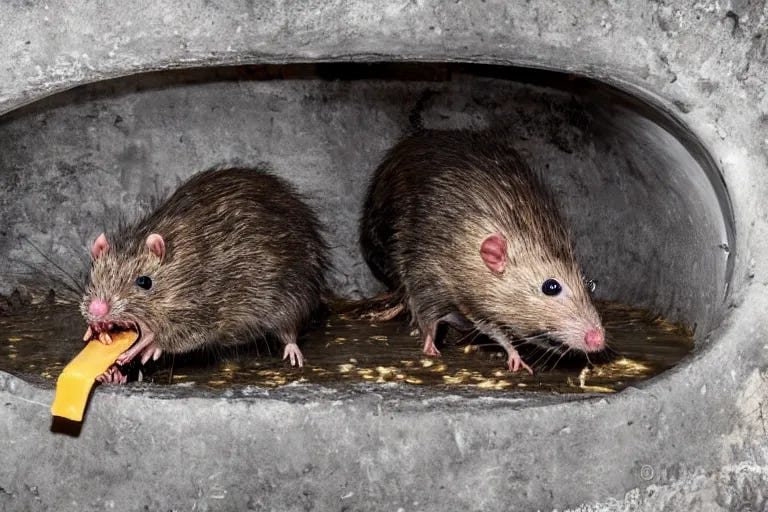Thanks to everyone who helped make Provoked a bestselling Substack newsletter! What a validation of these writing experiments.
I. Rats
Rats engage in meaningful play, such as wrestling, that provide insights into social dynamics. Contrary to David and Goliath stories, larger rats invariably win while their smaller counterparts end up losing. However, to maintain smaller rats as viable playmates, the larger rats employ strategic maneuvers. They intentionally lose or "throw" the wrestling match about 30% of the time. If they lose less frequently, the smaller rats retreat and prefer to play exclusively with rats their own size.

Don’t think of these big, dirty creatures as disingenuous (the 8th deadly sin - here). Think of larger rats as highly sentient beings who intentionally prioritize their values. In this case, friendship + play over ego.
At times, to preserve a cherished relationship, we need to step back or even walk away. This lesson isn't beyond us, especially when even rats, with their simpler cognitive abilities, can grasp it. You might argue, "But Todd, I am committed to 'living my truth' and being 'my authentic self'". This stance might hold if you're the sole person of significance in your world (an often misguided obsession - here).
However, I suspect that's not the case. You likely have several relationships you deeply value and for which you willingly make sacrifices, big and small. These relationships, rich in mutual meaning and satisfaction, are pillars of your well-being. And the people involved are likely ready to make the same sacrifices for you.
So consider the wisdom of the big, strategic, wise guru on value conflicts:
Provocations
This intriguing behavior in rats offers a fascinating lesson in social interaction, strategic compromise, and the intentional use of defeat. If rats, with their comparatively simple cognitive abilities, can master this art, certainly adults can apply the same in various situations. Consider a few thought experiments. Share your thoughts in the comments with the Provoked community.
In a corporate environment, what if a manager intentionally lost a minor internal competition to a less experienced team member? This could help in boosting the team member's confidence, foster a sense of achievement, and motivate them to take on bigger challenges.
Consider parent-child relationships. What if a parent strategically let their child win at board games or sports? This could help the child develop a sense of accomplishment, boost their self-efficacy, and encourage them to embrace challenges rather than shying away.
In the realm of international diplomacy, what if a powerful nation made calculated concessions during negotiations with a smaller nation? This could foster mutual respect and preserve peace in the looooong game.
In academia, what if a seasoned professor intentionally lost a friendly debate to a promising student? This could inspire the student to pursue knowledge more fervently and foster a sense of intellectual independence.
In a romantic relationship, what if a partner intentionally “lost” an argument over a trivial matter? This could maintain harmony and show the partner that their opinions are valued. Save the battles for when it matters more.
In a sports team, what if a star player occasionally let a less experienced teammate take the winning shot? This could build the teammate's confidence, fostering camaraderie, and strengthening team dynamics.
In a group of friends, what if the most outgoing friend intentionally stepped back to let the shy friend take the lead in organizing a social event? This could help the shy friend come out of their shell, enhance their organizational skills, and boost their social effervescence (damn do I love that phrase!).
In a music band, what if the lead vocalist let a backup singer take center stage for a performance? This could provide the backup singer with a valuable opportunity to showcase their talent and gain recognition.
In a cooking competition, what if a seasoned chef let a novice chef take the lead in preparing a complex dish? This could provide the novice chef with a unique learning experience and a chance to prove their culinary skills.
We must overcome simplistic notions of authenticity, social interactions, strategic losses, and values work. Be the big rat every once in awhile. For your relationships. For your self-development. To transcend and evolve.
Todd B. Kashdan is an author of several books including The Upside of Your Dark Side (Penguin) and The Art of Insubordination: How to Dissent and Defy Effectively (Avery/Penguin) and Professor of Psychology and Leader of The Well-Being Laboratory at George Mason University.
Read Past Issues Here Including:
Part 2 of 2 Incredible Discoveries About Attention-Deficit/Hyperactivity Disorder (ADHD)
Before reading this 2nd scientific discovery, make sure to read the first - here. II. Have you heard a parent or teacher yelling at a child to "sit still and concentrate"? A command echoing through classrooms and homes, especially towards children and adolescents with ADHD. But what if I told you, this is counterproductive advice? The opposite of what you should be barking out?






It reminded me of the concept of Tzimtzum I’ve read here: https://chiefexecutive.net/tzimtzum-powering-personal-and-organizational-growth-through-contraction/
now that would be interesting to test - is there a selfless element to this? is there a theory of mind that explains how its mutually beneficial? Keep it coming.